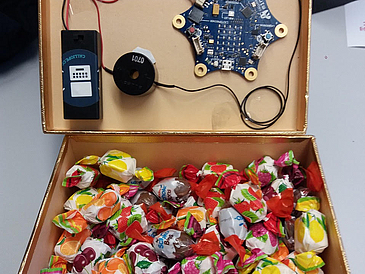Two years ago, at the IT summit in Saarbrücken, the federal government announced the goal of equipping elementary schools nationwide with the Calliope minicomputer (Microboard) in order to strengthen digital education. The initiative was not met with approval by all: critics not only doubted the benefits of teaching programming to these age groups, but also the practical feasibility. In order to clarify the most important questions quickly, the Deutsche Telekom Stiftung commissioned the University of Bremen with a one-year exploration study. Professor of teaching methodology in elementary schools (general sciences and social studies), Lydia Murmann, and the Digital Media in Education (dimeb) research group from the Center for Computing and Communication Technologies (TZI) were involved. The scientists have now presented their results: they assess the project as predominantly positive.
Practical Introduction to the Digital Society
“If elementary school students, who only a few weeks previously had little experience in using laptops or desktop computers, can successfully develop and implement their own programming ideas, then they have learned far more than just using a new type of technical device,” emphasize the authors of the “Calliope mini – Mikrocontroller programmieren im Grundschulunterricht” (Calliope mini – teaching microcontroller programming in elementary school) study. The students were able to implement their own plans through programming and thereby tested their role in the digital society.
On behalf of the University of Bremen, Professor Lydia Murmann (general sciences and social studies), Professor Heidi Schelhowe (interdisciplinary media education), and Dr. Iris Bockermann (interdisciplinary media education) led the study. For the implementation they cooperated with the Landesinstitut für Schule (state institute for schools – LIS) and three elementary schools in Bremen.
Highly Motivated Children
One of the questions at the beginning was whether the third and fourth graders were already ready for working with microcomputers. This was quickly affirmed. “The children handled the devices very independently,” reports Murmann. However, at the beginning each student had very different levels of understanding. One finding is therefore that before the Calliope teaching units, some basics of media education must first be worked out, for example the principle of files and the storage of data.
Within the framework of the study, various applications were programmed with the learning groups, for example a jump counter, an alarm system for boxes of candy, and the exchange of messages via the Microboard. “The children’s motivation was very high compared to other subjects,” explains Schelhowe. “We’re still not sure if it was the novelty of it all. But we believe it had a lot to do with practical action.”
Quick Training for Teachers
Teachers, too, quickly got to grips with the material and in some cases they did so despite a lack of prior knowledge. Training is necessary, but does not have to be time-consuming.
From the scientists’ point of view, it definitely makes sense to give students at this age a first insight into programming so that they can develop an understanding of their digital environment. “The aim of elementary school is that children learn to understand their lifeworld,” says Murmann. “This includes digital applications today.” In the case of children, the study showed no difference in motivation between girls and boys. The scientists hope that initial successes will help to get more girls interested in technical topics.
Study Available for Download
Those interested can download the Bremen “Calliope mini – Mikrocontroller programmieren im Grundschulunterricht” (Calliope mini – teaching microcontroller programming in elementary school) exploration study from the Internet. In the coming weeks a teacher handbook with six teaching modules (eleven double lessons) will also be published. It will be available in four languages: German, English, Portuguese, and Russian.
Additional Information:
“Calliope mini – Mikrocontroller programmieren im Grundschulunterricht” (Calliope mini – teaching microcontroller programming in elementary school) study: http://nbn-resolving.de/urn:nbn:de:gbv:46-00106848-17
www.uni-bremen.de/tzi/
www.uni-bremen.de
Contact:
Professor Lydia Murmann
University of Bremen
Faculty of Educational Sciences
Tel. +49 421 218-69410
E-mail: murmannprotect me ?!uni-bremenprotect me ?!.de
Axel Kölling
University of Bremen
Tel.: +49 171 530-5119
axel.koellingprotect me ?!uni-bremenprotect me ?!.de

